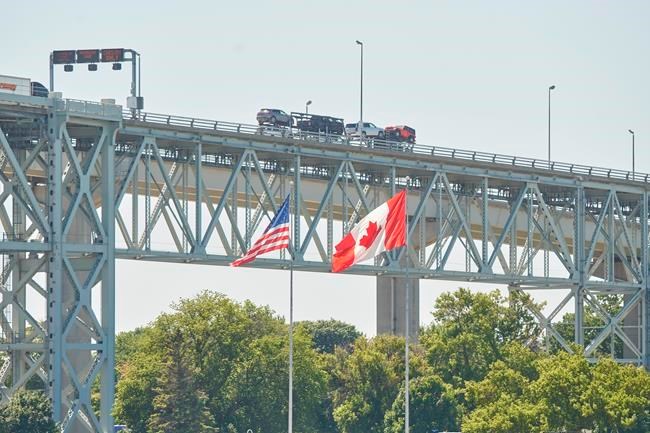WASHINGTON — With the federal election in the books and the United States clearly in no hurry to reopen the Canada-U.S. border, experts say the federal Liberal government should think about rebooting the way it deals with the country's largest and most important trading partner.
President Joe Biden's administration struck a dramatic contrast Monday when it unveiled a significant retool of the rules governing international travel and COVID-19, while in the same breath punting a decision on its northern border for another 30 days.
There's more going on there than the usual glacial pace of the world's largest bureaucracy, said Edward Alden, a journalist, author and senior fellow at the Council on Foreign Relations.
"Biden's approach is very much, 'Sure, we need to care about what happens in the rest of the world, but we need to look after Americans first,'" Alden said in an interview.
The evidence is everywhere: prioritizing Americans during the rollout of the COVID-19 vaccines, a sharper edge to protectionist Buy American policies, explicitly borrowing Donald Trump's vision for withdrawing from Afghanistan and the absence of any global trade ambitions.
"And I think you see it on the border stuff," Alden said — particularly in how the U.S. is confronting the burgeoning immigration crisis outside the Texas town of Del Rio, where thousands of Haitian migrants have been massing under a bridge that spans the U.S.-Mexico border.
"Biden wants to send the message that, No, I may be progressive, but I'm tougher on borders — and if I need to, I'll stick people in planes and fly them back to Haiti."
The Canada-U.S. border earned nary a mention Tuesday during national security hearings on Capitol Hill, where Homeland Security Sec. Alejandro Mayorkas, whose department is overseeing travel restrictions at the land borders, was one of the marquee witnesses.
Instead, Mayorkas was strafed with questions about mass deportations from Texas and the badly botched U.S. withdrawal from Afghanistan — two issues where Biden and his staff are keenly aware of the political dangers, which were on clear display Tuesday.
"Here's the problem: every time you come before this committee, you always say it's going to get better," Missouri Sen. Josh Hawley, a Republican and Trump loyalist, told Mayorkas of the migrant surge in Del Rio.
"And then, every time you leave, it gets worse and worse."
Biden, bruised by an Afghanistan withdrawal that went horribly wrong, took the lectern Tuesday at the United Nations General Assembly to deliver a sales pitch for what he described as "a new era of relentless diplomacy" around the world.
The speech touched on many of the themes Biden would punch in the days immediately after he took office, promising to restore America's lustre on the world stage after four years of isolationism, instability and international contempt.
"Simply put, we stand in my view at an inflection point in history," Biden told the assembled leaders. "Instead of continuing to fight the wars of the past, we are fixing our eyes on devoting our resources to the challenges that hold the keys to our collective future."
In a congratulatory phone call Tuesday with Trudeau, he hit all the usual diplomatic notes — "strong and deep friendship," "shared commitment," "deepening collaboration" — that typically punctuate White House readouts of discussions between the two leaders.
"The president expressed to Prime Minister Trudeau his desire to continue working closely and deepening collaboration with Canada — one of our nation's top partners," the readout said.
Alden said the election provides an opportunity for the federal government to name a new face to cabinet whose main job would be to burnish Canada-U.S. ties.
"It's a chance to say, 'Yeah, finding a new path forward with the United States is a top priority for this new government, and we're going to name a real star," he said. "In that sense, there may be a reset opportunity here."
Whether the federal Liberals want to spend some bilateral capital on the border issue is still to be seen, especially since air travel to the U.S. has continued unfettered, and trade shipments, essential workers and foreign students have been able to move between the two countries.
"If they do and it continues to be ignored or rebuffed or just not handled, then that will be a real problem," said Scotty Greenwood, president and CEO of the D.C.-based Canadian American Business Council.
"It already is a real problem, from a practical sense, for people in businesses that are accustomed to transversing the border. Will it become a foreign policy problem on Canada-U.S. relations? That depends on the Canadian approach."
Here's the thing, said Alden: even if Trudeau wanted to push back on issues like the Canada-U.S. border, he doesn't have a whole lot of leverage.
"Canada doesn't have other alternatives," he said. "The world is not awash with better options for Canada. Canada's tied to the United States, like it or not."
This report by The Canadian Press was first published Sept. 21, 2021.
James McCarten, The Canadian Press




